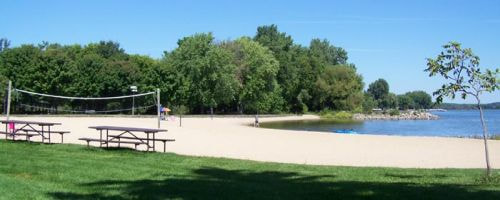|
Down the road from my house is Governor Nelson State Park. The wooded hill with its panther and conical effigy mounds, the prairie with its seasonal cranes strutting their stuff, and the Lake Mendota shore make it one of my favorite places to walk. We’d lived here awhile before I realized the park was named for the same Gaylord Nelson (Wisconsin governor 1959-63, U.S. senator 1963-81) who founded Earth Day on April 22, 1970, to promote environmental activism.
In my childhood in the 1950s, “Don’t be a litterbug!” was the message to keep America beautiful. The broader environmental movement began in 1962 with Rachel Carson’s bestseller Silent Spring, which described devastation to wildlife and human health from chemical pesticides. Reducing pollution beyond mere litter was too big a job for individuals alone. A flurry of legislation over the next decade addressed air and water quality, solid waste disposal, and more. Environmental not-for-profits proliferated. Municipalities in the 1970s offered recycling, first at centers and then curbside. Cars were redesigned to run on unleaded gasoline. Gaylord Nelson’s first Earth Day was fueled in part by the shock of oil disasters. In early 1969, the largest oil spill in U.S. history to that time blackened the beaches of Santa Barbara. It killed thousands of birds as well as dolphins, seals, and sea lions. Five months later, an industrial oil slick set Ohio’s Cuyahoga River ablaze. Americans recoiled. In 1970, millions attended Earth Day events and President Nixon established the Environmental Protection Agency. Protecting the environment had become a widely shared, nonpartisan value. When I volunteered for the local Token Creek Watershed in the late 1990s, I loved how old-time hunting-and-fishing conservationists and progressive environmental activists worked together to preserve a treasured habitat. As the spotlight shifts from litter to pollution to endangered species to climate change, might we again someday join forces to protect our common good?
2 Comments
Mike McQuestion
4/23/2024 07:18:35 am
Like the environment around us, our propensity to act collectively, for this and for other worthy causes, has been sapped. How has this happened and how can we fix it?
Reply
4/24/2024 09:50:56 am
How I'd love to know the answer to that! Thank goodness we still benefit from regulatory improvements of the '60s and '70s made before cooperation became a dirty word.
Reply
Leave a Reply. |
AuthorI'm a historian who writes novels and literary nonfiction. My home base is Madison, Wisconsin. Archives
July 2024
|

 RSS Feed
RSS Feed